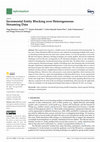Papers by Tiago Brasileiro Araújo

Information
Web systems have become a valuable source of semi-structured and streaming data. In this sense, E... more Web systems have become a valuable source of semi-structured and streaming data. In this sense, Entity Resolution (ER) has become a key solution for integrating multiple data sources or identifying similarities between data items, namely entities. To avoid the quadratic costs of the ER task and improve efficiency, blocking techniques are usually applied. Beyond the traditional challenges faced by ER and, consequently, by the blocking techniques, there are also challenges related to streaming data, incremental processing, and noisy data. To address them, we propose a schema-agnostic blocking technique capable of handling noisy and streaming data incrementally through a distributed computational infrastructure. To the best of our knowledge, there is a lack of blocking techniques that address these challenges simultaneously. This work proposes two strategies (attribute selection and top-n neighborhood entities) to minimize resource consumption and improve blocking efficiency. Moreover,...

IEEE/WIC/ACM International Conference on Web Intelligence
The widespread use of information systems has become a valuable source of semi-structured data. I... more The widespread use of information systems has become a valuable source of semi-structured data. In this context, Entity Resolution (ER) emerges as a fundamental task to integrate multiple knowledge bases or identify similarities between data items (i.e., entities). Since ER is an inherently quadratic task, blocking techniques are often used to improve efficiency. Beyond the challenges related to the data volume and heterogeneity, blocking techniques also face two other challenges: streaming data and incremental processing. To address these challenges, we propose PRIME, a novel incremental schema-agnostic blocking technique that utilizes parallelism to enhance blocking efficiency. The proposed technique deals with streaming and incremental data using a distributed computational infrastructure. To improve efficiency, the technique avoids unnecessary comparisons and applies a time window strategy to prevent excessive memory consumption.
Uploads
Papers by Tiago Brasileiro Araújo